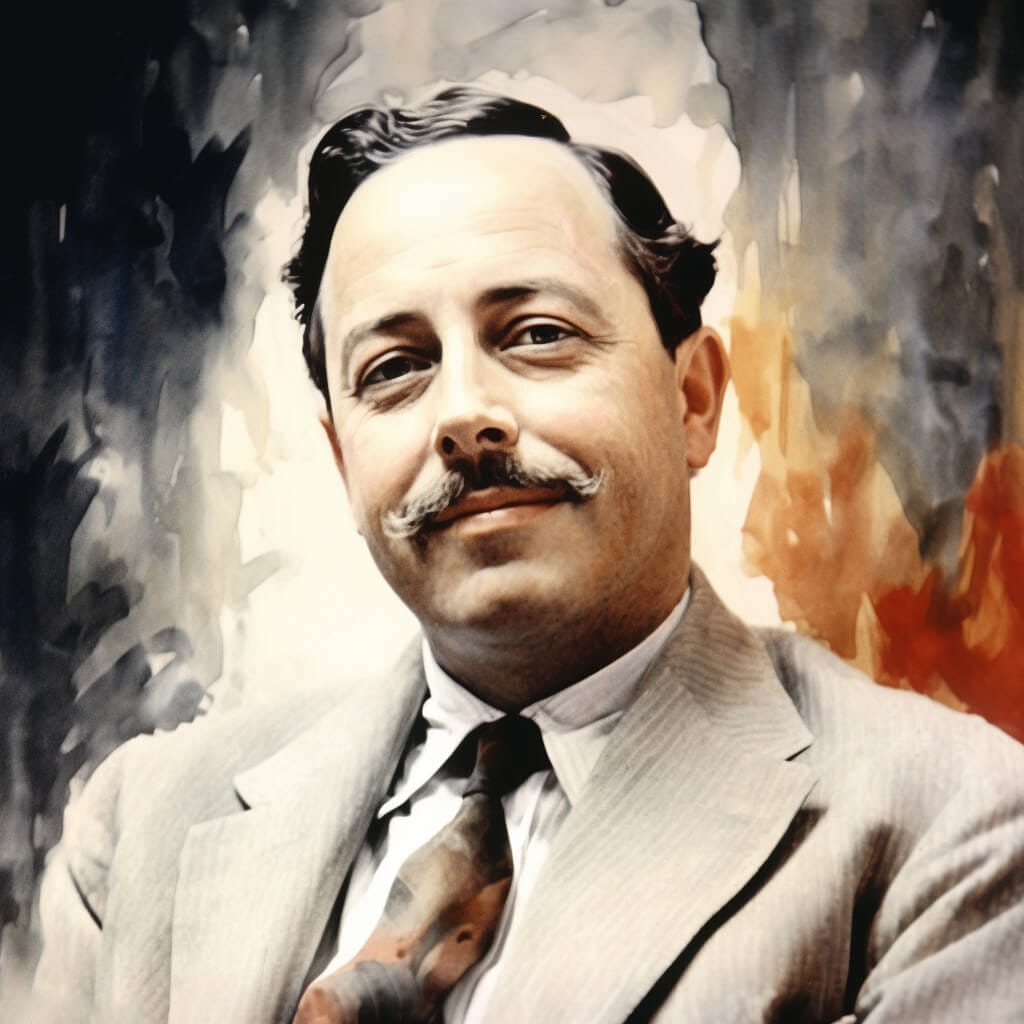Tennesee Williams has gone down as one of the greatest playwrights and authors in American history. Despite having a tough upbringing and adult life, he famously won the Pulitzer Prize twice for his iconic plays Streetcar Named Desire and Cat on a Hot Tin Roof. He has become a significant name in the LGBTQ+ literary community due to being openly gay at a time when it was taboo.
Top Questions
Despite being known mostly for his iconic plays, he did write a number of successful poems. One of his most well-known poems is ‘We Have Not Long to Love.’
Tennessee Williams was born on March 26, 1911, in Colombus, Mississippi, to Cornelius Coffin Williams and Edwina Dakin.
Tennessee Williams wrote a number of well-known poems. However, he was most successful in the world of theatre. His plays Streetcar Named Desire and Cat on a Hot Tin Roof won him the Pulitzer Prize in 1948 and 1955, respectively.
Tennessee Williams was inspired by many iconic literary figures, such as Anton Chekhov, Eugene O’Neill, William Faulkner, D. H. Lawrence, and Marcel Proust.
Unfortunately, on February 25, 1983, at the age of 71, Williams succumbed to his fight with drug addiction. It is believed that he had a toxic level of barbiturates or sedatives.
Early Life
Thomas Lanier Williams III, more commonly known as Tennessee Williams, was born into a Mississippi family on March 26, 1911. The family came from English, Welsh, and Huguenot heritage. Growing up in Columbus with his mother, father, and two siblings, Williams suffered from a number of ailments and became close to his mother, who was the main caregiver, considering his father was busy with work.
His father, Cornelius Coffin Williams, was a traveling shoe salesman who struggled with alcoholism, while his mother, Edwina Dakin, was musically inclined. He had a sister Rose Isabel, and a brother, Walter Dakin. It is believed that his father saw him as weak due to his illnesses, such as his fight with diphtheria.
Education
Williams’ formal education began when he attended the Soldan High School before moving to the University City High School in St.Louis. After excelling at school and winning prizes for his writing, he enrolled in a course at the University of Missouri in Columbia. Despite studying journalism from 1919 to 1931, he became disinterested and put his energy into his poetry and essays and entered a number of contests. His first significant recognition came with his play Beauty Is the Word in 1930. His work during this time got good feedback, but the money did not come with it.
His time at university would get put on pause as his father withdrew him due to him failing a military course in his junior year. A stint at the International Shoe Company began, but it only acted to push him further towards a life of writing and gave him the fire in his belly. At the age of 24, he made the decision to leave his job due to the mental health impact. He went back into education at Washington University in 1936. During his time there, he wrote the play Me, Vashya before deciding to transfer to the University of Iowa, which would turn out to be a positive move. He earned a B.A. in English in August 1938. He would study further at the Dramatic Workshop of The New School in New York City, where he found his passion for theater and playwriting.
Literary Career
In 1939, Williams took to leap into writing plays in New Orleans, where he became associated with the Works Progress Administration. This would prove to be a big step in his career, as a mere 5 years later, he developed the classic play The Glass Menagerie. Williams achieved further acclaim with A Streetcar Named Desire in 1947, solidifying his reputation as one of America’s greatest playwrights.
The 1950s were an important time for Williams, as he delved into different avenues stylistically. Cat on a Hot Tin Roof and Sweet Bird of Youth are two plays that came out of this period. He won a number of accolades along the way. His theatrical works had such an impact on American popular culture that many were adapted into other formats, such as cinema.
Personal Life
Williams had a number of issues that would rear their heads throughout his life. His sexuality and relationships caused him some anguish. He was openly gay in a time when it was much more of a taboo. Most famously, he had s relationship with Frank Merlo, who was key in keeping him grounded through tumultuous times.
Unfortunately, his family didn’t prove to be as beneficial as Merlo in his life. Despite being close, his sister Rose struggled with her mental health. Schizophrenia plagued her and ended up driving her towards a lobotomy, a brutal practice that was thought to relax the brain. However, we now know that drilling a hole into the brain is not the best way to treat a patient.
Much like his father, alcohol began to take hold of Williams’ life. He fought his depression with drugs and drink, which ultimately took its toll on his professional and personal life. Unfortunately, on February 25, 1983, at the age of 71, Williams overdosed on sedatives in New York City. He was ultimately buried in Calvary Cemetery in St. Louis, Missouri, despite having the wish of sea burial.
Achievements
Williams received numerous awards and honors throughout his career, including Pulitzer Prizes, New York Drama Critics’ Circle Awards, and induction into the American Theater Hall of Fame.
Long after his death, Williams is still celebrated. In 2009, Williams was inducted into the Poets’ Corner at the Cathedral of Saint John the Divine in New York City, with notable performers and artists participating in the event.
In 2011, to mark the centenary of his birth, the Harry Ransom Center at the University of Texas at Austin hosted the exhibition “Becoming Tennessee Williams,” showcasing 250 personal items, including manuscripts, correspondence, and artwork. The center is responsible for curating many documents from Williams’ life.
There are many more instances of the recognition of his contribution, such as:
- The Tennessee Williams Theatre in Key West, Florida, and the Tennessee Williams Key West Exhibit.
- He was an honoree in the Rainbow Honor Walk in San Francisco in 2014, recognizing his contributions to LGBTQ culture.
- The Tennessee Williams New Orleans Literary Festival.
- The Tennessee Williams Songbook.
- The Tennessee Williams Festival in St. Louis, Missouri.
- French singer Michel Berger dedicated a song to him.


